

How scientists can stop fooling themselves over statistics. The past decade has seen a raft of efforts to encourage robust, credible research.
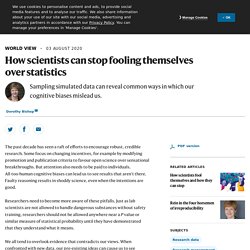
Some focus on changing incentives, for example by modifying promotion and publication criteria to favour open science over sensational breakthroughs. But attention also needs to be paid to individuals. All-too-human cognitive biases can lead us to see results that aren’t there. Faulty reasoning results in shoddy science, even when the intentions are good. Essay: Avoiding unfounded health claims on small molecules in scientific literature. JavaScript is disabled on your browser.
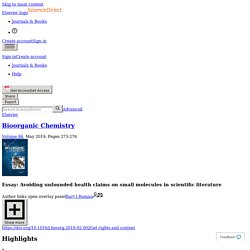
Please enable JavaScript to use all the features on this page. Highlights Unfounded health claims pollute scientific literature. Discussion of human and scientific causes. The Essential Medicinal Chemistry of Curcumin - Journal of Medicinal Chemistry. Citation data is made available by participants in Crossref's Cited-by Linking service.
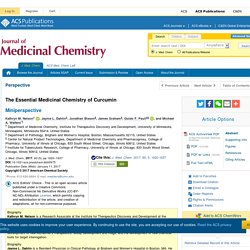
For a more comprehensive list of citations to this article, users are encouraged to perform a search inSciFinder. J. Unbelievable! Electrophysiologists Embrace 'Alternative Facts' Eggs Are Good for the Heart... or Not. A new study, appearing in the journal Heart, suggests that consuming more eggs cuts the risk of cardiovascular death.

But in this Deep Dive Analysis, F. Perry Wilson, MD, points out the myriad reasons that studies of this type are best left off the menu. אורז – השקר הלבן. IgG Food Intolerance Tests: What does the science say? I spend a lot of time as a pharmacist discussing side effects and allergies to drugs.
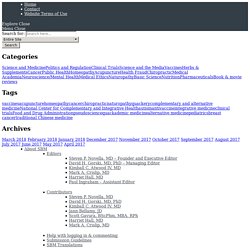
For your own safety, I won’t recommend or dispense a drug until I know your allergy status. I don’t limit the history to drugs—I want to know anything you’re allergic to, be it environmental, food, insects, or anything else. Allergies can create true therapeutic challenges: We can’t dismiss any allergy claim, but as I’ve blogged before, there’s a big gap between what many perceive as an allergy and what is clinically considered a true allergy. My concern is not only avoiding the harm of an allergic reaction, but also avoiding the potential consequences from selecting a suboptimal therapy that may in fact be appropriate. IgG Food Intolerance Tests: What does the science say? Medical Quackery Book Details Bad Ideas In Medicine : Shots - Health News.
An ad selling cocaine drops for tooth pain, from the book Quackery.
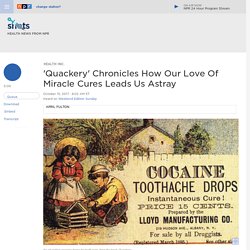
Courtesy of Workman Publishing hide caption toggle caption. Here's a list of 100 words scientists really want you to stop misusing. Dietrine clinical studies. Read This Before Spending Money on Adaptogens for Stress Relief. Are you feeling vaguely tired, anxious, maybe stressed?
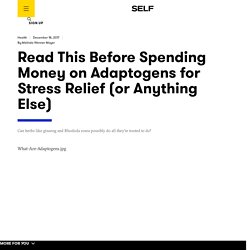
Don’t blame current events or the looming holiday season—your body’s stress response system is probably out of whack. What We Mean When We Say Evidence-Based Medicine. Ynet מה יש בספר שמעצבן את הרפואה המשלימה? - בריאות. חמישה דברים שהמדע יודע בוודאות שהם נכונים. מיתוס הדיקור הסיני. מאמרים בנושא מדע אסופה 1. What is a reliable resource? Peer review means that the study and its results have been reviewed by a group of people with the necessary expertise to assess the merits of the work.
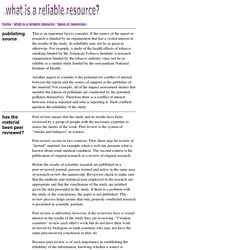
Peer review is the system of "checks and balances" in science. Peer review occurs in two contexts. First, there may be review of "factual" material, for example when a web site presents what is known about some medical condition. Science-Based Medicine 101: How To Establish A Source’s Credibility. Scientific Method. Scientific Method is a formal method for understanding phenomena.
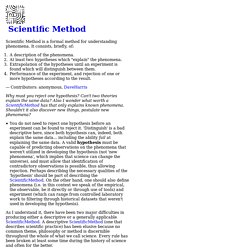
It consists, briefly, of: A description of the phenomena. At least two hypotheses which "explain" the phenomena. Scientific method. The scientific method is a body of techniques for investigating phenomena, acquiring new knowledge, or correcting and integrating previous knowledge.[2] To be termed scientific, a method of inquiry is commonly based on empirical or measurable evidence subject to specific principles of reasoning.[3] The Oxford Dictionaries Online defines the scientific method as "a method or procedure that has characterized natural science since the 17th century, consisting in systematic observation, measurement, and experiment, and the formulation, testing, and modification of hypotheses".[4] Experiments are a procedure designed to test hypotheses.
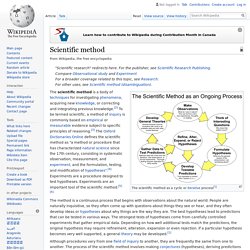
Experiments are an important tool of the scientific method.[5] [6] The method is a continuous process that begins with observations about the natural world. People are naturally inquisitive, so they often come up with questions about things they see or hear, and they often develop ideas or hypotheses about why things are the way they are. Overview. Is Coffee Bad for You? Or Good? What Does Science Say? We here at Bon Appétit are <del>pretty much</del> addicted to coffee: There's our first-thing-in-the-morning pot, the going-in-to-work cup the deli girl hands over without needing to hear our order, the midafternoon cortado, the after-dinner single-origin doppio—and that's leaving out a whole host of interstitial cups that allow us to face life without anxiety.
Well, almost without anxiety: Didn't Mom always say it would stunt our growth? Does coffee cause cancer? Or heart attacks? 'Big Chicken': The Medical Mystery That Traced Back To Slaughterhouse Workers : The Salt. In the 1950s, the poultry industry began dunking birds in antibiotic baths. It was supposed to keep meat fresher and healthier. That's not what happened, as Maryn McKenna recounts in her new book. Express/Getty Images hide caption toggle caption Express/Getty Images. Where's the Proof That Mindfulness Meditation Works? The concept of mindfulness involves focusing on your present situation and state of mind.
This can mean awareness of your surroundings, emotions and breathing—or, more simply, enjoying each bite of a really good sandwich. Research in recent decades has linked mindfulness practices to a staggering collection of possible health benefits. Tuning into the world around you may provide a sense of well-being, an array of studies claim. Multiple reports link mindfulness with improved cognitive functioning. One study even suggests it may preserve the tips of our chromosomes, which whither away as we age. WIZE: ד"ר קרן לנדסמן - מחלות נכחדות, ספקנות ובירה. מהפכת האימונותרפיה: איך זה עובד? Why people fall for pseudoscience (and how academics can fight back) Pseudoscience is everywhere – on the back of your shampoo bottle, on the ads that pop up in your Facebook feed, and most of all in the Daily Mail. Bold statements in multi-syllabic scientific jargon give the false impression that they’re supported by laboratory research and hard facts.
Magnetic wristbands improve your sporting performance, carbs make you fat, and just about everything gives you cancer. Of course, we scientists accept that sometimes people believe things we don’t agree with. That’s fine.